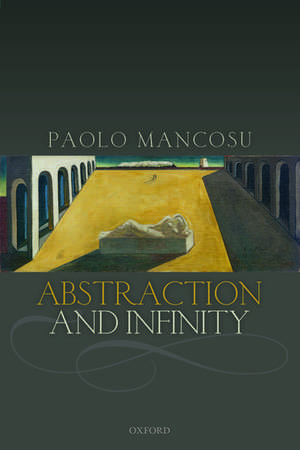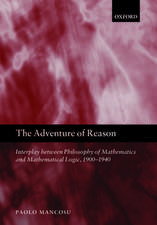Abstraction and Infinity
Autor Paolo Mancosuen Limba Engleză Paperback – 14 mai 2019
| Toate formatele și edițiile | Preț | Express |
|---|---|---|
| Paperback (1) | 169.54 lei 10-16 zile | |
| OUP OXFORD – 14 mai 2019 | 169.54 lei 10-16 zile | |
| Hardback (1) | 486.87 lei 10-16 zile | |
| OUP OXFORD – 15 dec 2016 | 486.87 lei 10-16 zile |
Preț: 169.54 lei
Preț vechi: 202.98 lei
-16% Nou
Puncte Express: 254
Preț estimativ în valută:
32.44€ • 33.96$ • 26.84£
32.44€ • 33.96$ • 26.84£
Carte disponibilă
Livrare economică 04-10 martie
Preluare comenzi: 021 569.72.76
Specificații
ISBN-13: 9780198822684
ISBN-10: 0198822685
Pagini: 240
Dimensiuni: 155 x 233 x 13 mm
Greutate: 0.36 kg
Editura: OUP OXFORD
Colecția OUP Oxford
Locul publicării:Oxford, United Kingdom
ISBN-10: 0198822685
Pagini: 240
Dimensiuni: 155 x 233 x 13 mm
Greutate: 0.36 kg
Editura: OUP OXFORD
Colecția OUP Oxford
Locul publicării:Oxford, United Kingdom
Recenzii
Mancosu's book is packed with new ideas, novel perspectives, and important insights, offering the reader a thorough and exciting examination.... The book should be required reading for anyone interested in the history and foundations of mathematics.
'I highly recommend Mancosu's book to philosophers and mathematicians interested in the philosophy or the history of mathematics and logic. It is rich in historical commentary and philosophical ideas. Mancosu not only proves to be one of the great detectives of the history of mathematical practice, but shows us how an historical approach to mathematical practice can, and in this case, does successfully move forward our current debates in the philosophy of mathematics.'
'It is an absolutely first-rate piece of work, both of scholarship and philosophy, which no one seriously interested in definition by abstraction, in Frege's work on the foundations of arithmetic, or in the neo-Fregean project, can afford not to study.'
'Mancosu's book is packed with new ideas, novel perspectives, and important insights, offering the reader a thorough and exciting examination of abstraction as a methodology that is not limited to a contemporary position in the philosophy of mathematics, but instead has been, and continues to be, a central component of mathematical methodology.'
'The book is a pleasure to read.'
'I highly recommend Mancosu's book to philosophers and mathematicians interested in the philosophy or the history of mathematics and logic. It is rich in historical commentary and philosophical ideas. Mancosu not only proves to be one of the great detectives of the history of mathematical practice, but shows us how an historical approach to mathematical practice can, and in this case, does successfully move forward our current debates in the philosophy of mathematics.'
'It is an absolutely first-rate piece of work, both of scholarship and philosophy, which no one seriously interested in definition by abstraction, in Frege's work on the foundations of arithmetic, or in the neo-Fregean project, can afford not to study.'
'Mancosu's book is packed with new ideas, novel perspectives, and important insights, offering the reader a thorough and exciting examination of abstraction as a methodology that is not limited to a contemporary position in the philosophy of mathematics, but instead has been, and continues to be, a central component of mathematical methodology.'
'The book is a pleasure to read.'
Notă biografică
Paolo Mancosu is Willis S. and Marion Slusser Professor of Philosophy at the University of California at Berkeley. He is the author of numerous articles and books in logic and philosophy of mathematics. He is also the author of Inside the Zhivago Storm: The editorial adventures of Pasternak's masterpiece (Feltrinelli, Milan, 2013). During his career he has taught at Stanford, Oxford, and Yale. He has been a fellow of the Humboldt Stiftung, the Wissenschaftskolleg zu Berlin, the Institute for Advanced Study in Princeton, and the Institut d'Études Avancées in Paris. He has received grants from the Guggenheim Foundation, the NSF, and the CNRS.


